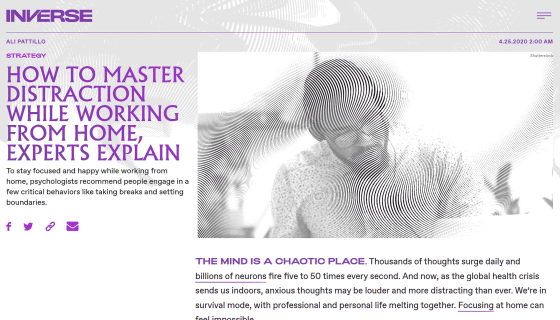How to avoid distraction while working from home and stay focused?

Many people have switched to working from home due to the epidemic of the novel coronavirus infection (COVID-19), but some people are not accustomed to working at home and some people may not be able to work well. Experts, including Dr.
How to master distraction while working from home, experts explain
https://www.inverse.com/mind-body/how-to-avoid-burnout-while-working-from-home

Since it is difficult to concentrate on work at home, which is a space for private life, “Attention is fragile regardless of whether it is a pandemic. Concentration is against distraction and constant interruption. Vulnerable, 'Denkova points out. So Denkova advises on how to focus while working from home.
◆ 1: Rebuild work environment
Working from home is more likely to be distracted by partners, children, roommates, etc. In addition, an emergency situation such as a COVID-19 pandemic can reduce the concentration of people.
Saunders argued that anything like TVs, pet dogs, kitchens, couches, partners, etc. could be a disruptive signal to do something other than work, so to focus on work, 'rebuilding the work environment. We recommend that you do. He said that by setting a solid working space and eliminating distracting things, you can reduce the possibility of distracting others while you work. Also, strictly defining the start time and end time of the work will help you to work properly while working from home.

◆ 2: Train your heart
Working in a pandemic situation can be stressful. In this situation, 'when people are under great stress, they will receive commands from the
So Denkova proposes to 'stop working at blazing speeds' in order to break the stressful cycle. While some people may want to get things done at once without interrupting their work, deliberately taking breaks can help prevent misjudgments and mistakes, Denkova noted. It seems that it is also useful for people who work from home to incorporate the Pomodoro technique that repeats the 'cycle of 25 minutes work and 5 minutes rest' or to exercise regularly.
It's also important to calm yourself from your daily work and internet moments, such as doing mindfulness or having your coffee away from your computer on your balcony. If all the emails seem to be urgent, you need to take a temporary distance from your work. 'Every time I feel stressed, suffered, or ache, the reaction stops and leads to overreaction. Stop and take a rest, then join the email or meeting again,' Denkova said. It was

◆ 3: Reconsider expectations about work performance
Even if you take various measures, it is unavoidable to be distracted when you work from home for the first time, which may reduce your productivity. Denkova says it's helpful for those who work from home to accept that they may not perform at their best.
Of course, you don't have to quit your job just because you can't do your best. Rather, he should calmly review the performance that he can exert and think what he can do in a day. “Sometimes it's anxious. You may be vulnerable, but at the same time you can take a five-minute coffee break at work at any time,” Denkova said of remote work. He pointed out that it is important to accept challenges and opportunities.

Denkova also advises managers on how to support remote-working employees.
◆ 1: At least several times a week, you can communicate individually via email, message app, and video call.
Even in remote work situations, managers can maintain one-on-one interactions with employees, allowing them to get the support they need, and without knowing it It can be avoided. If you work together in the office, you can provide this support in informal interactions, but remote work reduces informal contact with each other, so you have to interact with your subordinates as part of your job. There is.
◆ 2: Be patient, flexible and respectful
“We need to accept living in uncertain times and respect the way people adapt to their new everyday lives,” said Denkova, saying that work interactions take longer than usual. Even claimed that it wasn't a big deal.

Related Posts:
in Note, Posted by log1h_ik







